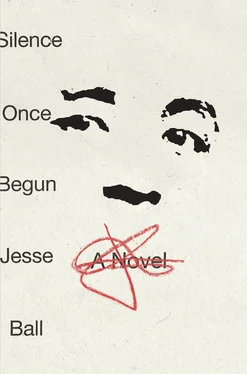[These are excerpts from long conversations, and so they may refer to things previously stated, or may begin in the midst of an idea, when something important had begun to be said.]

INT.
Mrs. Oda, you were speaking of that first day, when you received the call from the authorities, and went to visit Sotatsu.
MRS. ODA
We did not actually go that day. Neither I, nor my husband. Neither of my children.
INT.
Why was that?
MRS. ODA
My husband forbade it. He was horrified by the news. He sat in our house, in a room with no light on, just staring at nothing for many hours. When he came out, he said we would not go to see Sotatsu. He said he did not know anyone with that name and inquired whether I did.
INT.
And what did you say?
MRS. ODA
I said I did not. I did not know anyone by that name. He said he was sorry to hear about the confusion, and that the police thought we knew anyone like that, but we did not. I wanted to go, of course. Of course, I wanted to go. But, he was very clear about how it had to be.
INT.
What about your other children?
MRS. ODA
They were not living in our home at that time, and I hadn’t contacted them.
INT.
So, what changed? Why did you go to visit Sotatsu?
MRS. ODA
When I woke up in the morning, my husband was wearing some clothing I hadn’t seen him wear, an old suit, somewhat formal. He said it was possibly his fault, that we should see our son Sotatsu. I told him I thought that we should also. He said that didn’t matter, what we should do, but that we would do it. So, we went to the car and drove to the jail.
INT.
And what did you find there?
MRS. ODA
The officers did not want to look at us. I don’t think anyone looked us in the eye on that visit, or any other visit. They wanted to pretend we didn’t exist. I understand that, by the way. I understand how it would be. Such a job, to be at a jail. It is good that someone chooses to do it, I guess.
INT.
Was he far inside in the police station?
MRS. ODA
They moved his cell around. He wasn’t always in the same spot. Maybe because of discipline? He was often being punished, which his father agreed with. When I said I thought it was quite much that was being done, Mr. Oda told me that indeed, no, it was quite little. I don’t know much about these things. If you speak to my husband, he can perhaps remember more, or remember knowing more.
INT.
But the visit itself? You spoke to him?
MRS. ODA
We spoke. He did not. He was in a small cell at first. There wasn’t anything else in there at all, just a drain. I think they wanted him to start talking, but he wouldn’t. He looked very small in the prison clothing. I didn’t like to see it. I don’t like to think about it now.
INT.
I’m sorry, but can you just recall what you said to him?
MRS. ODA
I don’t believe I said anything. I was afraid to say the wrong thing and then that Mr. Oda would have it that we never visited again, so I stayed quiet. I wanted to see how he would say what it was that there was to say. He said, Son, you did this? They say you did this and that you said so, that you said you did. Did you do this? And Sotatsu said nothing. But he looked at us.
THE NARITO DISAPPEARANCES
[ Int. note . I felt a word about the Narito Disappearances was in order at this point. Permit me to interrupt the narrative a moment for clarity’s sake. It was to this crime that Oda Sotatsu confessed. When he signed the confession, it is my opinion he was somehow unaware that the crime had been carried out.]

The Narito Disappearances occurred in the villages near Sakai in the year of 1977. They began around June and continued up until the capture of Oda Sotatsu. The newspapers eagerly followed the case and it drew national press attention, culminating in a furor at Oda Sotatsu’s arrest. What was it?
Eight people disappeared, roughly two per month. There was no evidence of a struggle; however, it was clear that the disappearances were effected suddenly (food set out on the table, no personal objects missing, etc.). The people who disappeared were all older men and women, between the ages of fifty and seventy, who without exception lived alone. On the door of the residences a playing card was discovered, one per residence. No fingerprints of any kind were on the cards. No one witnessed the departure of any of the disappeared individuals. It was a powerful and gripping mystery, and as more and more people disappeared, the region went into shock. Patrols were even created to visit the homes of isolated or widowed individuals. But the patrols were never in the right place at the right time.
Sixteenth of October, 1977. Oda Sotatsu. Inspectors’ names unrecorded.
[ Int. note . Again, transcript of session recording, possibly altered or shoddily made. Original recording not heard.]

OFFICER 1
Mr. Oda, now that you have slept, perhaps you feel differently than yesterday?
ODA
(silent)
OFFICER 2
It is impossible for you, for things to get better for you, if you do not speak at all. You have signed a confession. You do not want a lawyer or any representation. You know what you did. We are concerned with finding the individuals mentioned, those individuals mentioned in your confession.
ODA
Is it possible that I could see it? I would like to see the confession.
OFFICER 2
That is impossible. You cannot see the confession. You wrote the confession. You know what it says. This isn’t a game. Tell us where to look. Where did you go with those people? Mr. Oda, our patience is growing thin.
OFFICER 1
You cannot see the confession. The inspector is correct. It is completely unnecessary. It is possible, of course, that if you cooperate, many things that are unnecessary can occur. As we said, better food, a larger cell, a different facility. Perhaps even this. I do not say yes, not at all. I don’t say that. But speak to us about these things and we will see what can happen.
OFFICER 2
This is about you. This is in your hands.
(Forty more minutes of quiet on the tape as the interviewers and Oda stare at one another. Finally, the sound of a door closing, and the tape clicks off.)
[ Int. note . This interview also was conducted at the house previously mentioned. Sotatsu’s brother, Jiro, was his most loyal supporter. He actually learned about what had happened and tried to visit the station prior to his parents. However, he was turned away, for reasons unknown. Perhaps the first interrogation had not yet happened at the time of his visit. It is unclear. I spoke to him at great length. Of all the family, he was the one most angry about what had happened. He had worked at a steel plant as a younger man, and was doing so in 1977. He later became active in organized labor. When I met him he was well dressed and drove an expensive car. Of his personal habits, I can say he smoked nearly an entire pack of cigarettes during each one of our conversations. I don’t know if this was usual for him, or if my presence and the subject of our discussions made him nervous. On several of the interviews, he was accompanied by his children, both young, who played in the yard while we spoke. Although he was very matter of fact, and even at times hostile with me, he was exceptionally soft-spoken with them. I had done judo for a while, and Jiro had also done so; at one point he broke in, out of the blue, to ask if I had ever done it. I had never said a word on the subject. When I answered yes, he laughed. I can always tell, he said. A judo man walks a bit differently. While this may have predisposed me to liking him, I assure you, I have tried at all times to be as objective as possible.]
Читать дальше













